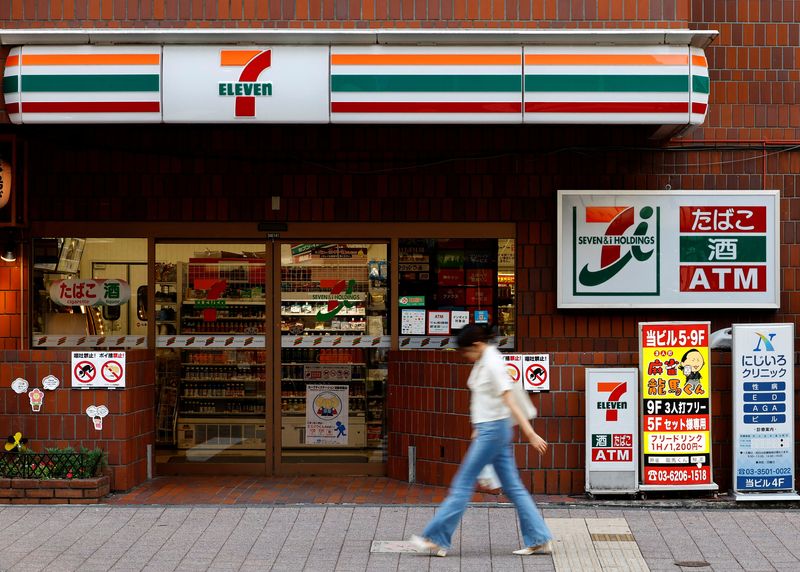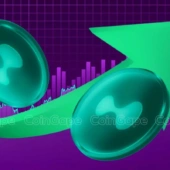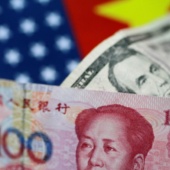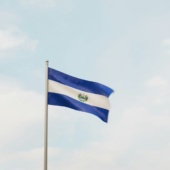By Ritsuko Shimizu and Kane Wu
TOKYO (Reuters) -Japan’s Seven & i Holdings has received a buyout proposal from a member of its founding Ito family, it said on Wednesday, a potential $58 billion white-knight bid as it weighs a rival offer from Canada’s Alimentation Couche-Tard
The offer for Ito-Kogyo, a company linked to Vice President Junro Ito and a top shareholder in 7-Eleven owner, is non-binding and under review by the same special committee set up to assess Couche-Tard’s takeover bid.
Separately, the Financial Times reported that “preliminary and limited” talks between Seven & i and Couche-Tard have begun, citing people familiar with the matter – a development that comes after months of reluctance on the part of the Japanese company to talk about a deal. Seven & i declined to comment on the FT report.
Sources have previously said Couche-Tard has sweetened an original offer to $47 billion.
Going private would allow Seven & i to continue under current management and remove pressure from shareholders to sell off more of its assets – as well as eliminate the threat from a bidder that it may see as hostile. A management buyout offer could also be a tactic to force Couche-Tard to bid more.
Seven & i said in a statement that no decision had been made regarding the management buyout offer (MBO), which Bloomberg News said earlier could be worth up to 9 trillion yen ($58 billion), adding that some 6 trillion yen in financing was being discussed.
At that size, the deal, which comes amid surging foreign interest in Japan M&A, would be the largest MBO in history. The biggest so far is the $32.9 billion paid for U.S. hospital company HCA (NYSE:) in 2006 when its founder teamed up with private equity heavyweights KKR & Co (NYSE:) and Bain Capital.
Seven & i’s shares surged in afternoon trade after having been suspended earlier in the day to close up 12%, valuing it at around $42 billion.
That Seven & i has received an official management buyout proposal was a sign “funding of a certain quality is in place,” said analyst Travis Lundy of Quiddity Advisors, who publishes on Smartkarma.
Lundy noted however that the size of the buyout was not yet clear. The newspaper earlier put the value of the buyout at more than 6 trillion yen.
Ito-Kogyo owned 8.2% of Seven & i as of August, making it the second-largest shareholder, according to a regulatory filing.
Couche-Tard representatives were not immediately available for comment.
BREAK-UP PRESSURE
The sprawling Japanese retailer has been under pressure to deliver more for shareholders after Circle K owner Couche-Tard emerged in August with a takeover bid.
Whether Couche-Tard manages to make good on its dream of creating a global convenience store powerhouse or management ultimately pulls off a buyout, the struggle for Seven & i suggests investors face increased competition and may have to pay more to secure deals in Japan.
Any transaction would only underscore the almost unprecedented level of interest in Japan deals from foreign investors after a regulatory overhaul lit a fire under companies to improve governance and convinced investors that better returns are ahead.
Japanese banks Sumitomo Mitsui (NYSE:), Mitsubishi UFJ (NYSE:) and Mizuho (NYSE:) were in talks to lend a combined 6 trillion yen to Seven & i, according to Bloomberg News, adding that trading house Itochu could also take part in the acquisition.
Representatives for the three banks and Itochu declined to comment.
Seven & i has come under considerable pressure from foreign shareholders in recent years, with some pushing for a break-up of the company. In turn, it has been trying to convince investors that it can deliver long-term growth on its own.
Under a restructuring announced last month, it aims to split off its supermarket operation and some 30 other “non-core” units into a holding company.

While the Japanese 7-Eleven convenience stores are a money-spinner, the company has been hobbled by poor performance at its supermarkets, including Ito Yokado stores which are a major part of the holding company it formed decades ago.
($1 = 154.73 yen)
















